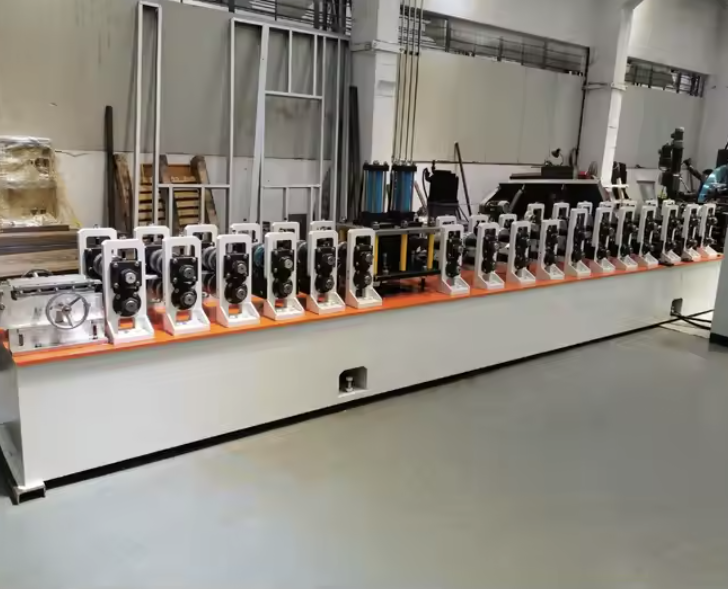
Posted on Wednesday, March 6, 2024
Japan, known for its cutting-edge technology and high manufacturing standards, has a thriving market for roll forming machines. These machines are widely used across various industries, including construction, automotive, and energy. This guide explores the most popular roll forming machines in Japan, highlighting their specifications, profiles, applications, maintenance requirements, and operational guidelines. We will also discuss the pricing range, leading manufacturers, troubleshooting, benefits, and limitations. Finally, we’ll explain how Machine Matcher can assist in purchasing the ideal roll forming machine suited to your business needs.
Specifications:
Roller Materials: High-grade steel with chrome coating
Frame Size: 300–450 mm
Motors: 5–15 kW, depending on production speed
PLC System: Mitsubishi, Panasonic, or Siemens-based
Cutting: Hydraulic cutting with precision blade system
Machine Speed: 12–30 m/min
Profiles Produced: Trapezoidal panels, corrugated panels, standing seam, and metal roofing sheets
Industries: Construction, residential and commercial building projects
Main Areas of Use in Japan: Tokyo, Osaka, Yokohama, and Nagoya
Specifications:
Roller Materials: Hardened steel with anti-corrosion coating
Frame Size: 350–500 mm
Motors: 18–30 kW for high production speed
PLC System: Fully automated with advanced HMI interface
Punching and Cutting: Hydraulic punching and cutting
Machine Speed: 10–25 m/min
Profiles Produced: W-beam and thrie-beam guardrails
Industries: Infrastructure, road safety, and highway projects
Main Areas of Use in Japan: Hokkaido, Fukuoka, Sapporo, and Kyoto
Specifications:
Roller Materials: Hardened alloy steel with zinc coating
Frame Size: 300–450 mm
Motors: 15–25 kW for high production rates
PLC System: Advanced control with touch screen interface
Cutting System: Servo-controlled hydraulic cutting
Machine Speed: 12–25 m/min
Profiles Produced: C and Z purlins
Industries: Steel structure construction, industrial building projects
Main Areas of Use in Japan: Osaka, Kobe, Hiroshima, and Kawasaki
Specifications:
Roller Materials: Heat-treated steel with chrome finish
Frame Size: 350–500 mm
Motors: 18–30 kW, high-efficiency motors
PLC System: Siemens or Mitsubishi system with real-time monitoring
Punching and Cutting: Hydraulic notching and cutting
Machine Speed: 12–20 m/min
Profiles Produced: Floor deck panels
Industries: Commercial and industrial buildings, multi-story construction
Main Areas of Use in Japan: Tokyo, Osaka, Yokohama, and Saitama
Specifications:
Roller Materials: High-strength steel with anti-rust coating
Frame Size: 300–450 mm
Motors: 10–20 kW
PLC System: Fully automated with real-time diagnostics
Cutting: Hydraulic cutting for precise edges
Machine Speed: 15–25 m/min
Profiles Produced: Solar mounting brackets and support structures
Industries: Renewable energy sector
Main Areas of Use in Japan: Fukushima, Tokyo, Kyoto, and Nagasaki
Unpack and inspect all machine components.
Position the machine on a flat, stable surface.
Connect the power supply as per the manufacturer’s guidelines.
Load the coil properly using a coil car or uncoiler.
Adjust the roller dies according to the desired profile.
Input Material: Feed the coil into the machine.
Profile Calibration: Adjust the rollers for precision.
Forming and Cutting: The profile takes shape as it passes through the rollers and is cut to length.
Stacking and Packaging: Finished profiles are stacked and prepared for shipment.
Daily: Check for loose bolts and lubricate moving parts.
Weekly: Inspect roller dies and check for wear and tear.
Monthly: Clean hydraulic systems and inspect PLC connections.
Annually: Conduct a full system diagnostics and recalibrate the machine.
Misalignment of Profiles: Realign rollers and adjust tension settings.
Uneven Cutting: Inspect and sharpen the cutting blades.
Hydraulic Leaks: Tighten hydraulic seals and inspect for damage.
PLC Malfunction: Check power supply and software configurations.
Material Jamming: Clear any obstructions and ensure smooth coil feeding.
High Initial Investment: Roll forming machines can be expensive.
Profile Limitation: Machines are generally designed for specific profiles.
Space Requirements: Large footprint requires significant floor space.
Operator Training: Skilled operators are needed for smooth operation.
High Production Speed: Consistent and efficient production.
Low Waste Generation: Minimal material wastage.
Profile Versatility: Can produce complex profiles with precision.
Long Service Life: Durable construction ensures extended machine lifespan.
Construction Industry: Roofing panels, floor decks, and structural components.
Automotive Sector: Structural reinforcements and interior paneling.
Renewable Energy: Solar mounting structures.
Infrastructure Projects: Guardrails and safety barriers.
Roofing Panel Roll Forming Machines: $25,000–$120,000
Highway Guardrail Roll Forming Machines: $60,000–$180,000
Purlin Roll Forming Machines: $35,000–$150,000
Deck Roll Forming Machines: $50,000–$200,000
Solar Mounting Bracket Roll Forming Machines: $40,000–$150,000
Yamato Machinery Co., Ltd.
Sankyo Seiki Co., Ltd.
Hitachi Zosen Corporation
Fujita Works Ltd.
Kobe Steel Ltd.
Site Preparation: Ensure a clean and level workspace.
Machine Positioning: Place the machine in the correct position for efficient operation.
Electrical Connection: Connect to the required power supply.
Testing and Calibration: Run initial tests and calibrate the rollers.
Operator Training: Provide hands-on training to operators.
Machine Matcher specializes in helping buyers find the best roll forming machines that meet their specific profile needs. With a large inventory and expertise in the roll forming industry, Machine Matcher ensures:
Comprehensive Machine Inspections: Ensuring machine quality before purchase.
Customized Solutions: Matching machines to your exact profile requirements.
Global Network of Manufacturers: Access to top manufacturers across Japan and beyond.
Expert Guidance: Our team helps with setup, installation, and operational guidance.
JIS (Japanese Industrial Standards): Ensures machine quality and safety.
ISO Certification: Compliance with international quality standards.
CE Marking: For exports, machines comply with European safety standards.
Speak to one of our roll forming machine experts today:
UK: +44 20 335 56554
USA: +1 407 559 7948
Europe: +32 460 24 13 95
WhatsApp: +44 20 335 56554
Email: [email protected]

Used Purlin Roll Forming Machines for Sale Worldwide
Posted on Sunday, January 25, 2026
Pre-Owned Roll Forming Machines for Purlin & Structural Steel Profiles

Used Roof Panel Roll Forming Machines for Sale Worldwide
Posted on Sunday, January 25, 2026
Pre-Owned Roll Forming Machines for Roofing Panel Production

Used Roll Forming Machines for Sale Worldwide
Posted on Tuesday, January 20, 2026
Pre-Owned Roll Forming Machines with Inspection, Verification & Global Support

Steel Coil Supply for Roll Forming Machines Worldwide
Posted on Tuesday, January 20, 2026
Reliable Steel Coil Supply for Roll Forming, Fabrication & Manufacturing Applications
Copyright 2026 © Machine Matcher.